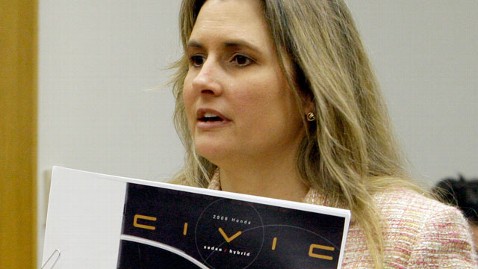L.A. Woman Took on Honda and Won - Can You?

Image Credit: Reed Saxon/AP Photo
ABC News' Ben Forer and Enjoli Francis report:
Now that Heather Peters has won $9,867 in small-claims court against Honda because her 2006 Civic Hybrid had failed to live up to the advertised mileage, others are tempted to file their own complaints in small claims courts.
But experts are divided over whether that strategy makes sense for most people. Some note that Peters is a lawyer, giving her an advantage in battling a major corporation like American Honda Motor Co.
Peters, 46, had opted out of a class-action suit because Honda's proposed class-action settlement would give aggrieved owners $100 to $200 each and a $1,000 credit toward the purchase of a new car. Instead, she pursued her personal claim in small claims court and won.
Randy Sottile, an automotive expert who has been involved in more than 11,000 lemon law cases, said the move is not for everybody.
"For the average consumer who does not have a lot of time and money, this would be at best a daunting task," he said.
But Richard Cupp, a law professor at Pepperdine University, applauded Peters' David versus Goliath approach.
"The results speak for themselves. She did 100 times better than $100," he told ABC News. "This case tells you that small-claims court is a possible and viable option we should consider."
Cupp said arguments that Peters had an edge because of her law background were overstated. He said that small claims courts tried to be very informal and get at the truth.
"They tend to relax the rules of evidence, relax the mystique of being in a court," he said. "It's built for normal folks. I don't want people to be discouraged from grabbing the bull by the horns. I think people can do it. It's not that scary."
He said that in California and other states, the amount people could win in small-claims courts was increasing - California doubled its cap to $10,000 - and that the Internet made filing claims and researching companies much easier.
Cupp said that the other 200,000 owners of the Hybrid Honda Civic model sold in 2006 had a chance to win as much as Peters did.
"She's done a lot of the hard work that benefit other people who might have claims against Honda," he said. "They don't have to reinvent the wheel. They can piggyback on the work she's done."
Sottile, however, suggested suing under lemon law provisions and advised against going to small-claims court because it's time consuming, costly and also limits other legal action.
"If a consumer goes to small-claims court, it is a court of final jurisdiction," Sottile said. "If she loses she has now given up her right to further legal representation in the form of a lemon law claim. … It's all or nothing."
Sottile said most attorneys will provide a free evaluation to consumers on their lemon law rights and in many states, including California, if a consumer brings a lemon law claim against a car company, the company is responsible for the consumer's legal fees regardless of who wins the case.
"Class action suits generally give a minimal reward back to the consumer, far less than they're legally entitled to in a lemon law claim and far less than other avenues they can pursue," said Sottile.
"Most class action cases requires consumers to opt out of the suit, so before a consumer stays in they should speak with an attorney to make sure it is the right decision," he said.